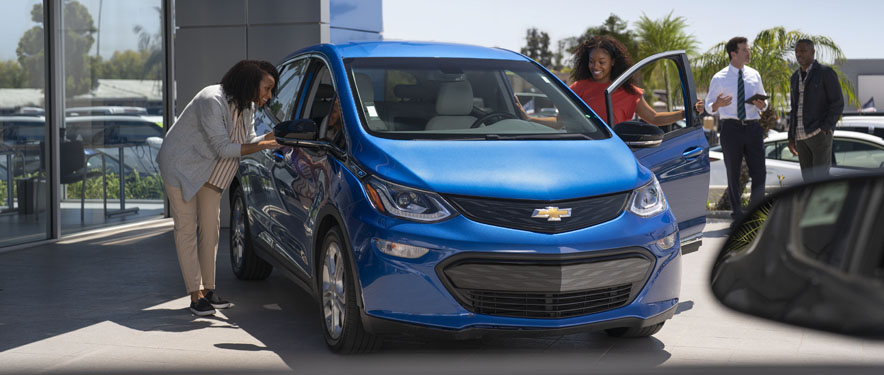- Home
- Financial Resources
- Financial Articles
- What’s a Co-Buyer — And Do I Need One?

Benefits of Having a Co-Buyer on Your Auto Financing Agreement
By Brooke Howell / 06/11/2024 / Auto Financing
While you could make a significant journey alone, having someone in the passenger seat could improve the experience. Similarly, having a co-signer on a car loan1 or lease can provide that same level of assurance. Although the terms "co-signer" and "co-buyer" are often used interchangeably, there are notable distinctions between the two:
What is a co-buyer?
As an equal partner on the financial agreement, a co-buyer shares the benefits of ownership and the financial accountability. This means that the co-buyer and the primary borrower have the same rights, such as the ability to sell the vehicle or trade it in (though both parties would have to agree to do so).
GM Financial, like many auto finance companies, gives you the choice to add a co-applicant to your agreement. The co-applicant would act as a co-buyer. Here's how this could work in your favor:
Increased Buying Power: When you add a co-buyer with a good credit history, you may increase the amount available to you for financing. This is because loan and lease amounts are based on the financial status of all applicants.
Lower Interest Rates: While interest rates may vary, credit scores that are considered prime or near prime may qualify for lower interest rates. You may save money on interest if you can combine your credit score with that of a co-buyer who has a prime credit score.
Improved Credit: If you are looking to build credit history or get a fresh start, a co-buyer with a strong credit history may help you get approved for credit. By making on-time payments, you may improve your credit score and build a positive credit history.
Shared Financial Responsibility: As an equal partner on the financial agreement, a co-buyer shares the benefits of ownership and the financial accountability. This means that both the primary borrower and the co-buyer are responsible for making payments and maintaining the vehicle.
Easier Approval: Having a co-buyer on your contract may make it easier for you to get approved for financing, especially if you have a poor credit history. By adding a co-buyer with a good credit history, you may increase your chances of getting approved for auto financing.
However, co-buyers need to trust each other to fulfill their financial obligations. Both parties are equally responsible for making payments, and missed payments can negatively impact both credit scores. It’s important to consider all aspects of having a co-buyer on an auto financing contract before entering into an agreement.
What is a co-signer?
A co-signer also is someone who signs a loan or lease agreement alongside the primary borrower, but this person doesn't have any ownership rights to the vehicle, whereas a co-buyer is a joint owner of the vehicle.
A co-signer is most often used when the primary borrower has limited credit history or lower-than-average credit score. If the primary borrow defaults or is unable to make payments, the co-signer is responsible for paying off the debt.
Like a co-buyer, having a co-signer can increase the chances of the borrower getting approved for a loan or lease, and it can also result in a more favorable interest rate. But there are potential risks for both parties to having a co-signer on your auto financing:
Risk to Relationship: Adding a co-signer to your auto financing can put a strain on your relationship with them, especially if you fail to make payments. If you default on your loan, it can damage your co-signer's credit score and financial well-being, and they may be held responsible for making payments.
Shared Financial Risk: A co-signer shares the financial responsibility of the loan or lease. If you fail to make payments, your co-signer will be responsible for making payments, and it could impact their credit score and financial well-being.
Limited Financing Options: Some lenders may not allow co-signers or may have restrictions on who can be a co-signer. This can limit your financing options, and you may have to look for other ways to finance your vehicle.
Liability for Damage: A co-signer may be liable for any damage to the vehicle, even if they don't use the vehicle. This can impact their financial well-being and put them at risk of lawsuits or legal action.
Having a co-applicant on your contract can have its benefits. Keep in mind that one of the best financial decisions you can make is to always use credit responsibly. Check out our tips for managing your credit and other auto financing resources.
1A retail installment contract that allows a customer to purchase a vehicle from an auto dealership. Contracts are then sold or assigned by the dealership to finance companies like GM Financial. For simplicity’s sake, we’ll refer to retail installment contracts as “loans.”
By Brooke Howell, GM Financial
Brooke Howell is a storyteller who loves digging up ways to improve money management and help others make smart financial decisions. She has three American Staffordshire terriers, one curmudgeonly Chihuahua and doesn’t do anything by halves (except marathons).
Related Articles

The pros and cons of long-term auto financing
Long-term auto financing is gaining popularity. Get the ins and outs to see if it’s right for you.
LEARN MORE
Which Auto Financing Option Is Right For You?
When it comes to getting a new vehicle, there are many options to consider, including how to pay for it. We’re answering your top questions around auto financing to help you make an informed decision.
LEARN THE DIFFERENCES